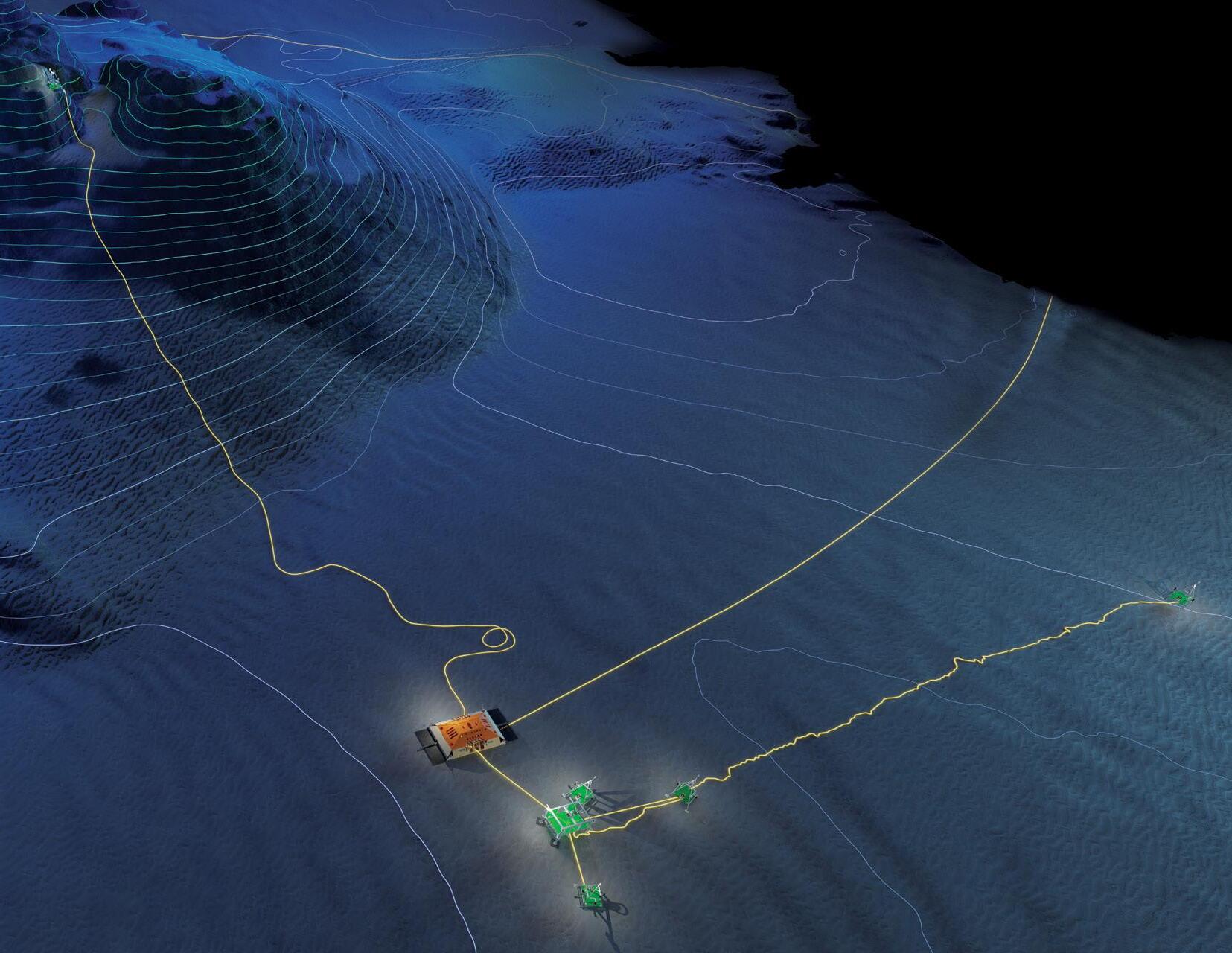
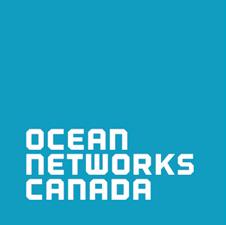
ANNUAL REPORT 1 APRIL 2022 – 31 MARCH 2023
Cover image: 3D rendering of the bathymetry (seafloor typography) of the Folger Deep and Folger Pinnacle cabled observatory sites within NEPTUNE observatory. Instrumentation is not to scale.
Credits: GIS & Data Stewardship team, ONC
What’s Inside
INTRODUCTION
MESSAGE FROM PRESIDENT & CEO
WORLD-LEADING OCEAN OBSERVATORIES
SERVICES & SOLUTIONS
SCIENTIFIC DISCOVERIES
TRANSFORMING OCEAN SCIENCE

COMMUNITY-BASED MONITORING
BIG DATA
KNOWLEDGE & LEARNING
UNITED NATIONS OCEAN DECADE
COLLABORATIONS
ONC’S REACH
CHAIRS’ MESSAGES
FINANCIALS FY22/23
#knowtheocean FY22/23
3 4 6 8 10 12 14 16 18 20 22 24 27 28 29
Introducing Ocean Networks Canada
Ocean Networks Canada (ONC) operates worldleading observatories in the deep ocean, in coastal waters, and on land of the Pacific, Atlantic, and Arctic coasts of Canada, collecting ocean data that accelerates scientific discovery and makes possible services and solutions that support life on our planet.
ONC, an initiative of the University of Victoria (UVic), is Canada’s national ocean observatory. ONC has installations and local partnerships with Indigenous and coastal communities on all three coasts, and more than 32,000 users of its scientific data around the world.
The ocean data collected by ONC’s cabled, mobile, and community-led observatories are accessible to all through ONC’s Oceans 3.0 data portal.
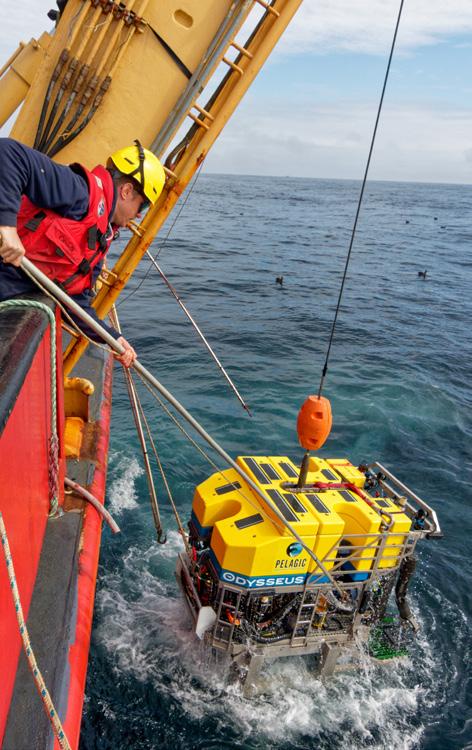
By embracing multiple ways of knowing, ONC supports ocean health through enhanced coastal monitoring, science that promotes ocean resilience and a sustainable blue economy, data that inform maritime safety, and education programs that strengthen our connection to, and stewardship of, the ocean.
ONC is committed to:
(1) advancing ocean observing;
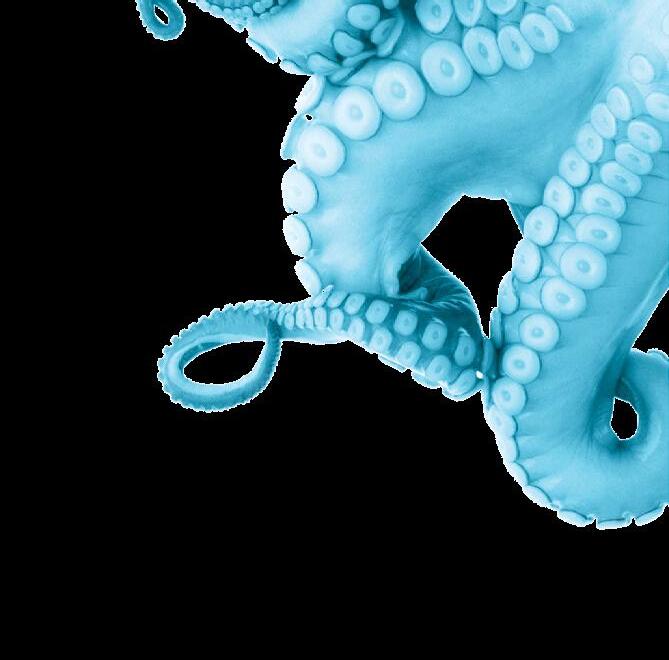
(2) delivering world-class data and data products;
(3) enabling ocean-based solutions for climate change mitigation and coastal resilience.
Vision
ONC enhances life on Earth by providing ocean intelligence that delivers solutions for science, society, and industry.
Equity, Diversity, and Inclusion
ONC is building a culture of belonging that increases our capacity to effectively address and serve the interests of our global community. Achieving a comprehensive and profound understanding of the ocean requires diversity of perspectives, and an equitable and inclusive approach. In removing barriers to participation, we collectively advance our knowledge and understanding of the world. ONC is committed to advancing equity, diversity, and inclusion within ocean science and technology.
Land and Sea Acknowledgement
We acknowledge and respect the lək̓ʷəŋən peoples on whose traditional territory the University stands and the Songhees , Esquimalt, and W̱SÁNEĆ peoples whose historical relationships with the land continue to this day. We also acknowledge the many Indigenous communities with whom we have the honour to collaborate on coastal monitoring and data management solutions.
Page 3 Annual Report FY22/23
Transforming Ocean Science
I am exceptionally proud of our dedicated staff who have brought Ocean Networks Canada from its origins as a pioneering cabled observatory into its current position as a world leader in ocean observing. ONC has become a global force in data for ocean sustainability and for pursuing climate change solutions; that feat made achievable by the professionalism and commitment of our teams, and from the support of our partners within Canada and internationally.
ONC has leveraged its expertise and assets to advance major programs and projects under the United Nations Decade of Ocean Science for Sustainable Development. These include developing innovative solutions for climate mitigation, adopting and advancing state-of-the-art technology, delivering data tools and products, and ensuring the inclusion of Indigenous knowledge in ocean science.
ONC spearheads big data collection, curation, quality, and delivery. Thanks to funding from the Canada Foundation for Innovation and Fisheries and Oceans Canada, as well as other funding partners, ONC will continue delivering globally accessible data that advances scientific discovery, climate solutions, maritime safety, and coastal community resiliency for years to come.
Comprehensive ocean observation involves multiple players, including Indigenous perspectives. To this end, ONC fosters and establishes valued partnerships with Indigenous communities on all three coasts of Canada. These partnerships weave traditional knowledge with western science for the benefit of local and global communities, and transform the way we approach ocean science.
In closing, I would like to acknowledge with gratitude those staff who have recently or soon will be moving on from our organisation after decades of service to ONC. Their dedication has helped us set and achieve the highest standards in ocean observing, as we continue to evolve and grow our leadership in ocean discovery and stewardship.
 Kate Moran President & CEO
Kate Moran President & CEO
OCEAN NETWORKS CANADA Page 4

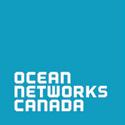
Page 5 Annual Report FY22/23
WORLD-LEADING OCEAN OBSERVATORIES
ONC’s deep-sea, coastal, and land-based observatory infrastructures capture vital continuous data about the Pacific, Arctic, and Atlantic oceans.
ONC’s cabled observatories supply power and Internet connectivity to scientific instruments and 12,000+ ocean sensors along with mobile and land-based assets, including coastal radar.
These observatories support research on complex Earth processes in ways not previously possible, providing access to free, open, long-time series ocean data from anywhere in the world, in near real time.
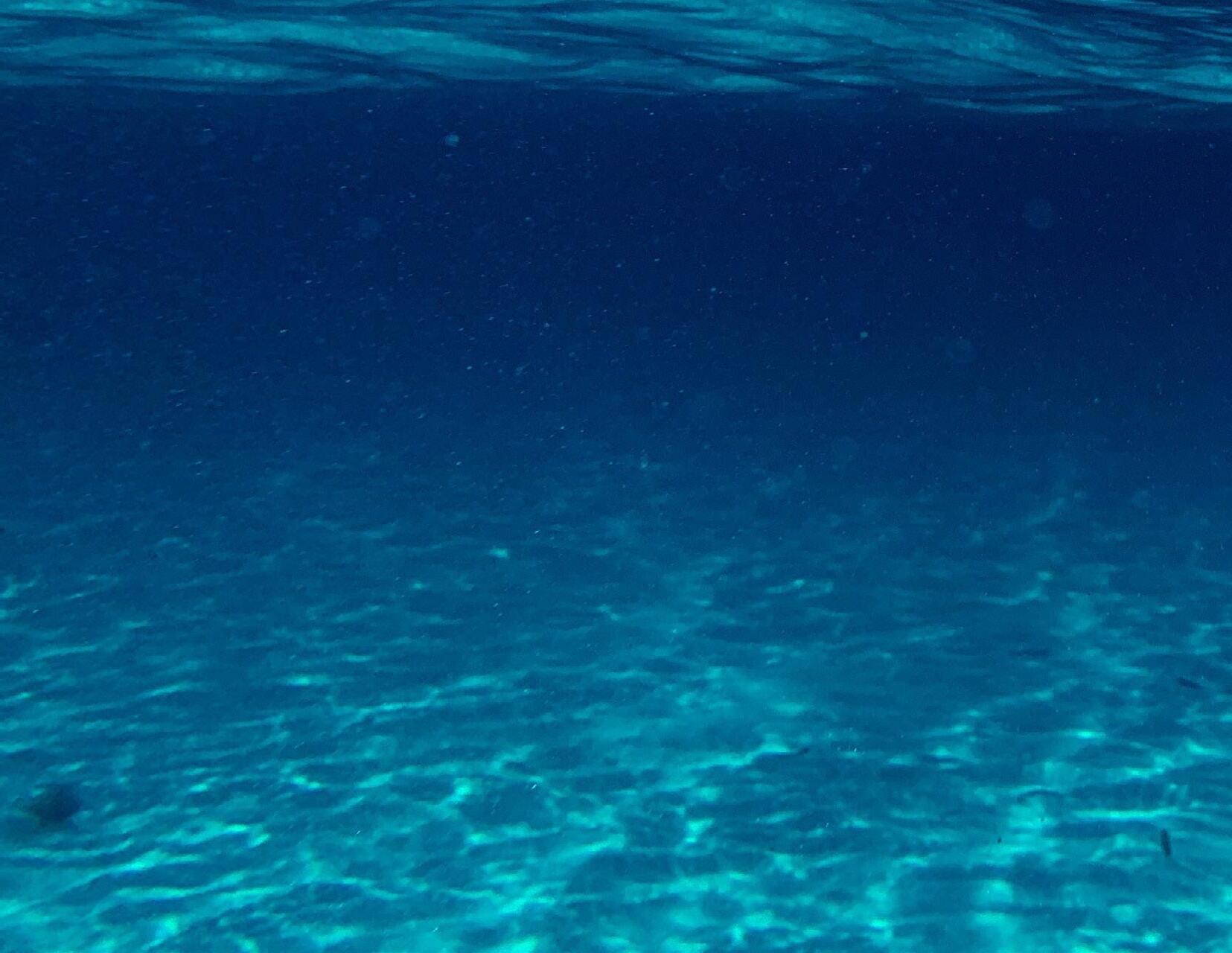
Expeditions Recap: Observatory Maintenance & Ocean Exploration
Explore highlights that include three ONC-led expeditions in FY22/23 to maintain ONC’s two major cabled ocean observatories located up to 300 kilometres offshore, and at depths ranging from 100 to 2,660 metres, off the east and west coasts of Vancouver Island.
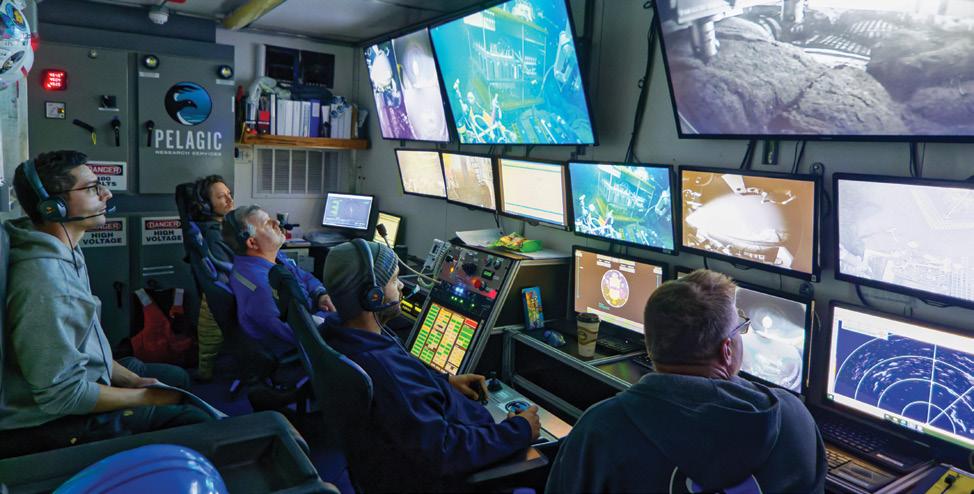
While aboard the Canadian Coast Guard Vessel (CCGV) John P. Tully, the #ONCAbyss expedition crew utilised the Pelagic Research Services’ remotely operated vehicle (ROV) Odysseus to recover, install, and connect instruments, and to collect samples for scientific research.

All dives were live-streamed from the ship, and highlights were shared on social media, enabling ocean enthusiasts from around the world to join the undersea exploration.
MAY 17, 2022 – JUNE 7, 2022
#ONCabyss Spring Expedition
The spring expedition conducted maintenance and installation operations on NEPTUNE, ONC’s underwater observatory located off the west coast of Vancouver Island. It comprises 800+ kilometres of fibre optic cable that powers instruments with thousands of sensors.
Highlights:
• Recovered Wally, the benthic crawler that measures temperature, pressure, and currents.
• Recovered the vertical profiler system to measure water quality at multiple depths throughout the 400-metre water column.
• Deployed a DIDSON sonar camera that studies fish behaviour and biodiversity by combining video, images, and sound with acoustic imaging.
• Reconnected the Endeavour cable, bringing the site back online since its disconnection in August 2021
OCEAN NETWORKS CANADA Page 6
The control room on board the John P. Tully during an #ONCAbyss 2022 expedition.
JULY 26, 2022 – AUGUST 7, 2022
#ONCabyss Summer Expedition
The expedition crew returned to NEPTUNE, streaming live from sites including the abyssal plain region of Cascadia Basin, the diverse habitat of Barkley Canyon, and the superheated and mineral rich chimneys at the Endeavour hydrothermal vent field.
Highlights:
• Expanded ONC’s earthquake early warning seismic network at Endeavor node and Barkley Upper Slope.
• Deployed a camera for a new Barkley Canyon cold-water coral communities study.

• Deployed a new sediment trap at Endeavour to better understand sedimentation processes and to sample marine snow (organic matter).
SEPTEMBER 20, 2022 – SEPTEMBER 30, 2022 #ONCabyss Fall Expedition
ONC’s final expedition visited the deep, offshore NEPTUNE observatory locations at Cascadia Basin, Endeavour, Barkley Canyon, and the shallow VENUS observatory locations at the Strait of Georgia and Saanich Inlet.
Highlights:
• Successfully searched for and recovered the Delta Dynamics Laboratory (DDL), which had moved about 90 metres from its original deployment location due to strong turbidity currents. DDL data informs long-term studies of underwater landslides at the mouth of the Fraser River that affect British Columbia’s coastal waterways and communities.
ONC supported partner-led research expeditions to explore underwater mountains that rise more than 1,000 metres from the seafloor in the Northeast Pacific, and the earthquake-prone region of the Cascadia Basin off Vancouver Island.

SEPTEMBER 13, 2022 – October 27, 2022
CLOCKS Expedition
ONC supported the CLOCKS expedition—led by GEOMAR Helmholtz Centre for Ocean Research— aboard the German research vessel Sonne to assess the risk of future earthquakes in the Cascadia region off Canada’s west coast.
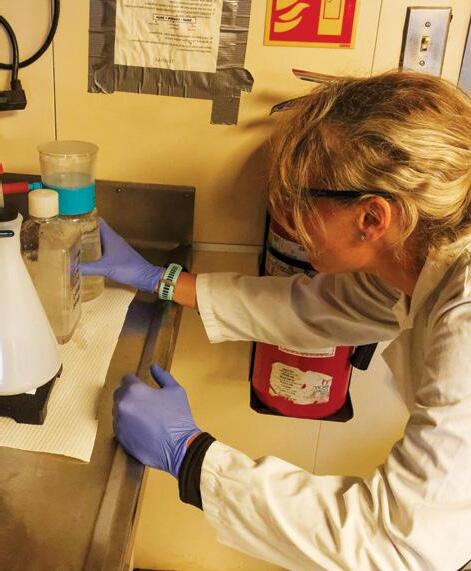
JUNE 8, 2022 – JUNE 27, 2022
Northeast Pacific Deep-Sea Diversity Expedition
ONC supported Fisheries and Oceans Canada, the Council of the Haida Nation, and the Nuu-chah-nulth Tribal Council on this expedition aboard the CCGV John P. Tully that explored and monitored deep-sea ecosystems, including seamounts, within several existing and proposed marine protected areas in the Northeast Pacific.
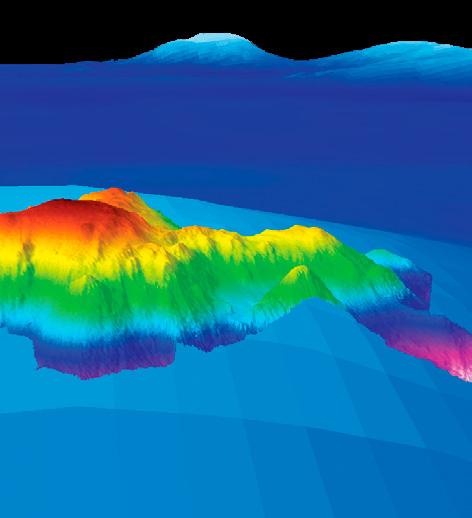 Seawater sampling, #ONCAbyss 2022.
The Delta Dynamics Laboratory.
Seawater sampling, #ONCAbyss 2022.
The Delta Dynamics Laboratory.
Annual Report FY22/23 Page 7
Mapping of seamounts.
SERVICES & SOLUTIONS
ONC delivers ocean intelligence products and services that support public and marine safety, climate change mitigation, scientific research, and coastal resilience, while accelerating ocean technology research and development and a sustainable blue economy.
Earthquake early warning
ONC’s seismic sensor network demonstrated its value in FY22/23, providing up to 71 seconds of notification to Vancouver and Victoria before ground-shaking arrived from small-to-moderate earthquakes off Canada’s west coast.

The earthquakes occurred close to ONC’s 50 land and eight ocean floor sensors located near the seismically active Cascadia Subduction Zone where the Juan de Fuca and North American tectonic plates converge. ONC’s earthquake early warning (EEW) system detects the primary wave of an earthquake as it occurs in real time; then, using a sophisticated algorithm to calculate the earthquake’s location and magnitude, determines when the secondary groundshaking waves will reach outlying locations.
ONC’s soon-to-launch EEW service for operators of critical infrastructure in British Columbia will enable them to take protective measures—such as slowing trains, pausing surgeries, shutting off gas valves and diverting flights—thereby saving lives and infrastructure.
Monitoring for megathrust earthquakes
ONC successfully completed its first wave glider geodesy mission off the west coast of Vancouver Island in August 2022, after the GPS-equipped autonomous floating platform spent nearly two months monitoring tectonic movement along the Cascadia Subduction Zone.
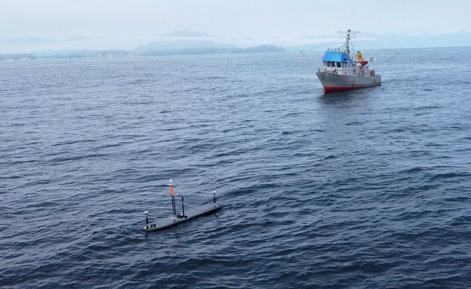
ONC’s pioneering geodesy project aims to utilise real-time data to monitor both the horizontal and vertical changes in plate motion and the slow tectonic deformation. The overarching goal is to use this knowledge to diminish the devastation of potential catastrophic megathrust earthquake events.
ONC’s subsea/land sensor network provides earlier notification, compared to land-basedonly networks, for some earthquakes near the Cascadia Subduction Zone.
Strait of Georgia Folger Passage Barkley Canyon Cascadia Basin Middle Valley Clayoquot Slope NEPTUNE observatory Vancouver Island BRITISH COLUMBIA WASHINGTON Nanaimo Vancouver Tofino 14 15 15 15 Victoria CascadiaSubductionZone Juan de Fuca Plate Explorer Plate Pacific Plate North American Plate NootkaFaultZone SovancoFaultZone Juan de Fuca Ridge Explorer Ridge
OCEAN NETWORKS CANADA Page 8
Recovery of the wave glider by the RV John Strickland in August 2022.
Ocean-based carbon dioxide removal as a climate solution
Ocean-based carbon dioxide removal (CDR) has significant potential for addressing the climate crisis. ONC’s existing observatories offer the perfect testing and monitoring infrastructure for various CDR approaches and technologies in a range of ocean environments.
One CDR solution well underway is the ONCled Solid Carbon project, which aims to remove atmospheric carbon dioxide (CO2) via direct air capture and inject it below the seafloor’s sediment layer. There, it will react with ocean basalt and mineralize into rock, providing a safe, vast, and permanent reservoir for this greenhouse gas. One of the benefits of this negative emissions technology is its ability to be scaled-up globally.
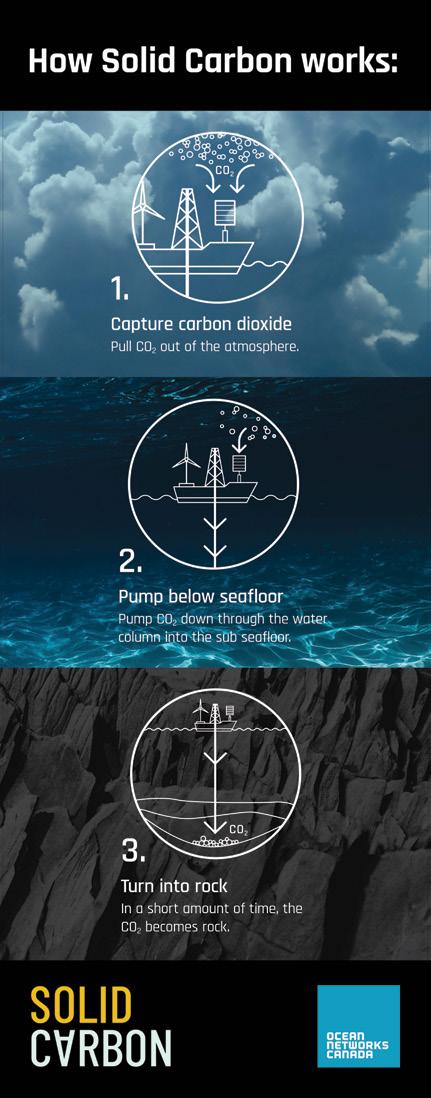
Modelling and laboratory experiments have demonstrated that Solid Carbon has the potential to sequester 20+ gigatons/year of CO2 (up to half of what must be removed from the atmosphere to limit global warming to 1.5°C). The research team projects that 25 years post-injection, 95% of the CO2 will be mineralized.



The project is ready to advance to a field demonstration at Cascadia Basin where it can be monitored by ONC using the NEPTUNE observatory. The Solid Carbon feasibility study is funded by the Pacific Institute for Climate Solutions, and involves researchers from Canada, the United States, and Europe.
A sensor located along the Canada Line SkyTrain in Richmond independently verified ONC’s 43-second advance notification of ground shaking from a 4.8 magnitude (M) earthquake near Tofino on November 25, 2022. Infrastructure operators also received more than 71 seconds of warning after a 5.7M earthquake on April 13, 2023.
In 2022, Solid Carbon researchers Dr. Adedapo Awolayo (left) and Dr. Benjamin Tutolo from the University of Calgary demonstrated that CO2 injected into ocean basalt may turn into solid rock in approximately 25 years.
Page 9 Annual Report FY22/23
Solid carbonate mineral formation (small bumps) on basaltic minerals (large chunks), photographed through scanning electron microscopy. Credit: University of Calgary.
SCIENTIFIC DISCOVERIES
Thousands of seafloor instruments enable multi-disciplinary research within biological, chemical, geological, and physical oceanography disciplines, and extend to the fields of particle physics, forensics, material sciences, climate change impacts, climate change solutions, and seismic resilience.
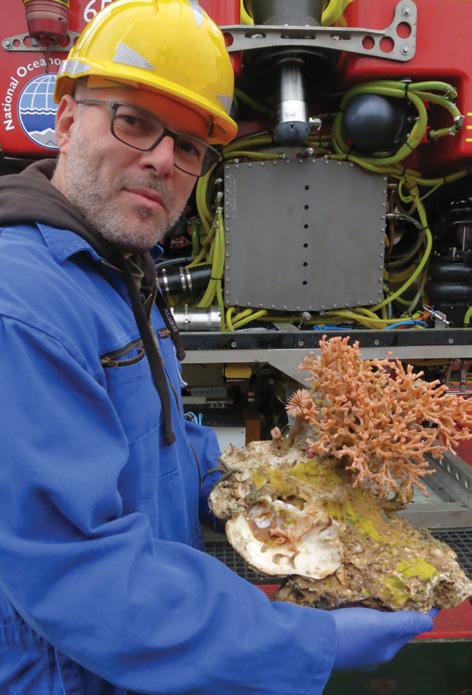
Researchers can access ONC instruments and data remotely from anywhere on the globe, in real time.
Science highlights
Researcher-in-residence: Claudio Lo Iacono
Coral communities are an important hotspot of biodiversity in oceans around the world. They face many threats, including pollution, bottom trawl fishing, and ocean acidification from climate change.
Claudio Lo Iacono, ONC researcher-in-residence from June to October 2022, worked with ONC senior scientist Fabio De Leo on a new study of cold-water coral communities located in Barkley Canyon. Their research is contributing to the management and conservation of these vital ecosystems.
Blue carbon and nature-based climate mitigation
The salt marshes, mud flats, and eel grass meadows of temperate river estuaries are more effective at capturing and storing greenhouse gases (GHGs) than young coastal forests. They may also sequester carbon for centuries, if not millennia, according to ONC-supported research published in the journal Frontiers in Marine Science in April 2022.

”Blue carbon”—carbon dioxide (CO2) captured from the atmosphere by marine plants and algae—collects as organic debris in estuary sediments where low-oxygen conditions prevent their decomposition. That makes undisturbed estuaries a potent passive carbon storage system with a global potential to capture and store GHGs emissions at the gigatons scale.

Lead author Tristan Douglas, a 2021 UVic graduate from the School of Earth and Ocean Sciences, spent two years analysing the physical and chemical properties of sediment cores collected from the Cowichan estuary salt marsh. This study also benefited from shared Indigenous knowledge from Cowichan Elders about the pre-colonial condition of the study site.
“We need to be looking at these kinds of blue carbon nature-based solutions to mitigate the impact of CO2 emissions on our climate.”
Kim Juniper Research supervisor and ONC chief scientist
ONC chief scientist Kim Juniper (left) and MSc graduate Tristan Douglas (right) processing a sediment core for blue carbon evaluation in the Cowichan Estuary. Credit: Cory Arnold.
ONC researcher-in-residence Claudio Lalocono holding a coral sample.
OCEAN NETWORKS CANADA Page 10
Science knowledge legacy: the Roy Hyndman Ocean Observing Award
It is with profound sadness that ONC marked the passing of Roy Hyndman in 2023. His decades of groundbreaking geophysical research and hundreds of academic publications changed our collective understanding of how the world works. He was a respected colleague, a valued mentor, and a steadfast advocate for ONC.
“Dr. Roy Hyndman was a trusted advisor to ONC for the better part of the last two decades,” says Benoît Pirenne, director, user engagement. “Roy helped shape the future NEPTUNE observatory and continued to actively lend his support. His name will live on through the graduate student award that we created in 2022.”
Roy Hyndman served as chair of the ONC Ocean Observatory Council for more than six years, and he mentored and inspired hundreds of young scientists and students throughout his long career. The Roy Hyndman Ocean Observing Award will continue to support students of ocean science for years to come.
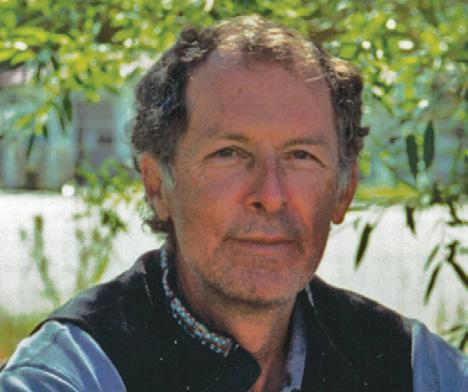
Roy was a fellow of the Royal Society of Canada, president of the Canadian Geophysical Union, director of the Pacific Geoscience Centre, chair of the Ocean Observatory Council, professor emeritus at UVic, and recipient of the Canadian Geophysical Union J. Tuzo Wilson medal for contributions to geophysics and the Geological Association of Canada Logan medal for contributions to geoscience.
Linking climate impacts to sea urchin migration
ONC ocean data revealed a change in the behaviour of deep-sea fragile pink sea urchins that scientists have linked to climate change impacts, such as the ‘Blob’, a marine heatwave that persisted in the Pacific Ocean off North America from 2013 to 2016.
The research team from ONC, Memorial University, and UVic analysed physicochemical and video imagery data captured by ONC’s NEPTUNE observatory in Barkley Canyon, along with 14 years of Fisheries and Oceans Canada trawl survey data. They found that the urchins moved up to 49 vertical metres, at a rate of 3.5 metres per year, as food sources and oxygen levels declined at lower depths due to a warming ocean. The urchins returned years later when temperatures cooled.
Scientists expect that pink urchins will migrate again to shallow water as the Northeast Pacific oxygen minimum zone continues to expand, and climate change increases the frequency of marine heat waves. This could impact the wider coastal ecosystem and economy by displacing the shallow water commercial fisheries species, red sea and green sea urchins. This research attracted nationwide coverage on television, print, and radio.

Annual Report FY22/23 Page 11
Illustration by UVic with ONC senior scientist Fabio De Leo (pictured).
Year In ReviewTRANSFORMING

OCEAN SCIENCE
ONC is transforming ocean science with real-time data, technology innovation, and through partnerships with Indigenous communities. Comprehensive ocean observation involves multiple perspectives. ONC supports enhanced coastal monitoring that weaves together Indigenous and western knowledge systems to inform decision-making for a sustainable ocean future.
The geographic diversity of ONC deep sea and coastal observatories represent the widest range of environments of any ocean-observing infrastructure on Earth, and provide a real-time window into how the ocean is changing.
Scientific publications using ONC data in FY22/23:
By the numbers
• 59 peer-reviewed journal articles
• 93 book chapters, abstracts, conference proceedings, presentations, posters
• 5 theses (3 PhD & 2 Master’s)
“Previously, data was collected on ships, here and there, one point at one time, and then the next day the ocean would change. ONC can get an understanding of the full picture of the ocean using in situ sensor systems.”
Ocean music from deep-sea data
How an artist sees the world can illustrate multiple viewpoints of ocean science—from exploring humanity’s relationship with the ocean to igniting new research questions and fostering experimental approaches.
Musician Colin Malloy sonified data from ONC’s Oceans 3.0 data portal and paired them with the Caribbean steelpan musical instrument to explore humanity’s relationship with oil and water. This electroacoustical work—and graduate research—was funded through the ONC Artist-in-Residence program, a partnership between ONC and UVic’s Faculty of Fine Arts, Faculty of Science, and Office of Research Services. Malloy is an award-winning percussionist, composer, and ONC’s third artist–in-residence.
Malloy closed his residency with the program’s first in-person recital in January 2023. Later that year, he graduated with a PhD in music technology.

Kate Moran
ONC president and CEO
Range of scientific disciplines using ONC data
OCEAN NETWORKS CANADA Page 12
ONC artist-in-residence Colin Malloy performs at UVic. Credit: Photo by UVic photoservices.
Embracing the power of “two-eyed seeing”
A “two-eyed seeing” approach that combines Indigenous and western knowledge systems is crucial for protecting the ocean, according to co-authors behind an ONC-supported PLOS Biology Perspectives publication. The article acknowledges the marginalisation of Indigenous marine ocean knowledge acquired through millennia of lived experience and observation. It also identifies how to pursue genuine ocean science partnerships.
“Two-eyed seeing: Embracing the power of Indigenous knowledge for a healthy and sustainable Ocean”, was published in the fall of 2022. It was the result of panel discussions held at the Partnership for the Observation of the Global Ocean (POGO) in January 2021 and 2022.

The international group of co-authors, including Kim Juniper, ONC’s chief scientist, defines a better path forward as one requiring and resourcing genuine co-creation between western science and Indigenous coastal communities from the projects’ outset. This approach incorporates respect for the Indigenous ethics frameworks, such as two-eyed seeing, and Indigenous decision-making status as ocean rightsholders.

“Access to ocean observing technologies is critical to advancing Indigenous governance of traditional ocean territories, enabling Indigenous participation in the blue economy and mitigating risks for climate change and ocean hazards.”
Mia Otokiak
Former ONC youth science ambassador
Page 13 Annual Report FY22/23
Mia Otokiak speaks on behalf of ONC and her community at the UN Ocean Conference in Lisbon, Portugal in April 2022 about the ONC Cambridge Bay observatory.
Year In Review Cambridge Bay observatory’s 10th anniversary
COMMUNITY–BASED MONITORING
ONC’s community-led observatories, developed in partnership with Indigenous Peoples on all three coasts of Canada, connect oceanographic instruments, training, and scientific support with traditional knowledge and stewardship built over generations.


ONC works directly with coastal communities, Indigenous governments, and organisations across Canada to develop and support community-based ocean monitoring initiatives that meet specific local needs, support ocean health, and advance Indigenous ocean science leadership.
October 2, 2022 marked the 10-year anniversary of the Cambridge Bay observatory, a pioneering partnership between ONC and the people of Cambridge Bay, the impact of which extends well beyond its Arctic location.
This milestone celebration attracted coverage in the mainstream media following the release of a commemorative story and bilingual video that shared the history and scientific discoveries of ONC’s first community-led observatory.
The observatory consists of an onshore meteorological station and a shallow underwater cabled sensor network. Community members conduct year-round instrument measurement of
their own local environment, collecting baseline and long-time series data for tracking the changing ocean and sea-ice conditions.
These data, along with Inuit ocean knowledge, provide vital insights into the rapidly changing Arctic, which is warming at least three times faster than the average global rate. Arctic communities like Cambridge Bay, known in the Inuinnaqtun language as Iqaluktuuttiaq (ᐃᖃᓗᒃᑑᑦᑎᐊᖅ, which translates to “good fishing place”), are at the forefront of adapting to these changes.
The Cambridge Bay observatory has shaped how ONC engages with community partners, with an emphasis on local leadership. It is the inspiration for a continuously growing network of community-run observatories—10 as of FY22/23—supported by ONC on all three coasts of Canada.
Colleagues from the Arctic Research Foundation, Viventem Science Support Agency, and Our World Underwater Scholarship Society supporting the deployment of a CTD instrument during Cambridge Bay observatory operations, 2022.
OCEAN NETWORKS CANADA Page 14
Community Fishers
ONC’s Community Fishers program partners are monitoring—by boat or snowmobile—their local ocean conditions at more than 350 locations on the Pacific, Atlantic, and Arctic coasts of Canada.
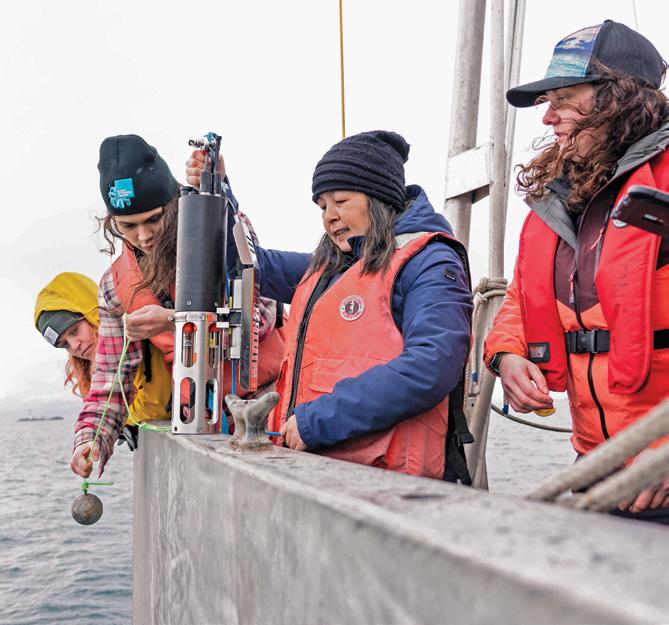
ONC trains members of participating communities to collect and upload high-quality ocean data into the ONC Oceans 3.0 data portal using a custom-designed app, and develops ocean monitoring programs that meet local needs.
The data collected by participants of the Community Fishers program provide important information on how seawater temperature, oxygen, and salinity levels are changing at different depths, and help monitor climate impacts and environmental changes that can affect ocean health and marine habitat.
Iqaluit Community Fishers Marine Project
Measurements of temperature change and other environmental factors can now be paired with observations— such as species shifting in the Arctic’s Frobisher Bay—thanks to a fouryear Community Fishers project that wrapped up in March 2023.
ONC partnered with the Iqaluit community in Inuit traditional territories in the Qikiqtaaluk Region on Baffin Island in Nunavut to conduct this study. Project funding was provided by the Fisheries and Oceans Canada Ocean Protection Plan.
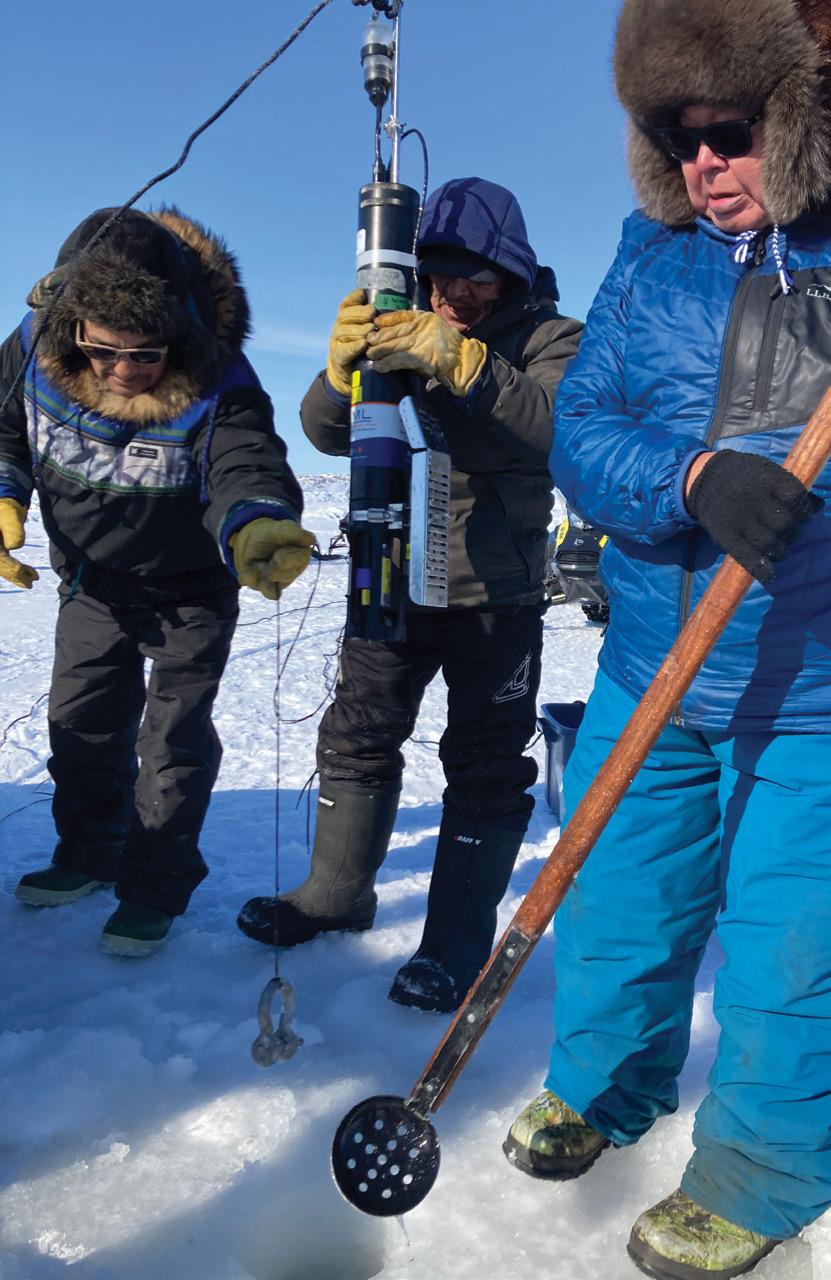
The project trained and employed community members to collect a baseline of oceanographic data of Frobisher Bay’s current environmental state and seasonal dynamics. Training from ONC staff included a two-day UVic accredited course on how to use oceanographic instrumentation, conduct safe field operations, and collect and access data via Oceans 3.0.
Local research priorities include measuring impacts from increased marine shipping and infrastructure, and tracking climate-related changes that may impact sea-ice conditions and local ecology. The success of this Iqaluit partnership will see the program being offered in other Inuit communities.
This image is co-owned by the Nunatsiavut Government and ONC who are working in partnership to support community-based ocean research initiatives. This specific project on board the RV John Strickland was an early-career training opportunity in collaboration with the Ocean Frontiers Institute’s Sustainable Nunatsiavut Futures project.
Annual Report FY22/23 Page 15
Imoona Karpik (right) clears ice from the hole just augered in preparation for lowering a CTD instrument during Iqaluit Community Fishers training.
BIG DATA
ONC ocean observing networks generate big data in the form of high-resolution sensor measurements, video, and underwater sound recordings from the Pacific, Atlantic, and Arctic Oceans. These FAIR (findable, accessible, interoperable, reusable) data—accessible to everyone via ONC’s Oceans 3.0 data portal—are used by over 32,000 researchers, communities, and decision-makers around the world.
Decolonizing data
ONC is working with Indigenous communities and other partners to explore best approaches for supporting Indigenous Peoples’ sovereignty over their own ocean data as part of a broader drive towards decolonization of data acquisition and ownership.
With members from Indigenous coastal communities, ONC and the Canadian Integrated Ocean Observing System launched a year-long pilot program in March 2023 to explore a new digital marker tool. Developed by global initiative Local Contexts, this tool is a suite of customizable labels that can be applied to data to reinforce Indigenous sovereignty over that dataset. These digital markers help communities gain control over how data within territories are collected, managed, accessed, and used in the future.
ONC will be an early adopter in Canada of these Traditional Knowledge (TK) and BioCultural (BC) labels and notices, the latter of which are used by researchers and institutions to identify Indigenous collections and interests in data.
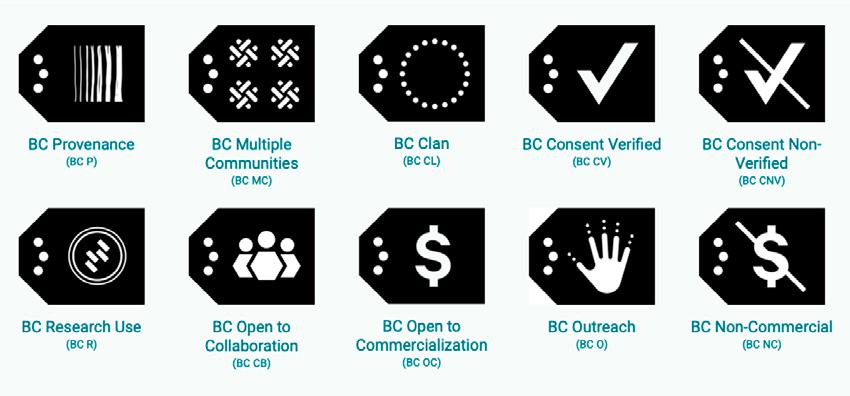
Reyna Jenkyns, ONC’s data stewardship manager, believes this project is the start of an important process to officially recognise Indigenous cultural and intellectual property, and to evolve data management practices.
“ONC will continue to support truth and reconciliation in Canada through the development of new tools and strategies that recognize our Indigenous community partners and promote ethical data use for all,” says ONC president and CEO Kate Moran.
A fundamental feature of the data collected by ONC’s coastal and Indigenous partners is data ownership, control, and attribution by the communities conducting the research. ONC ensures datasets are as open as possible.
These big data projects (above and right) are supported by the Digital Research Alliance of Canada, a non-profit organisation funded by the Government of Canada.

OCEAN NETWORKS CANADA Page 16
BC Labels define community expectations about appropriate use of biocultural collections and data.
Better, reproducible, and traceable science

The move to open source data and the dynamic nature of big data present multiple challenges to research data management. One challenge is how to identify where a dataset comes from, an essential component of reproducible, traceable science. Complicating that task is the sheer volume of new data being collected, minute by minute, with more than 140 terabytes of ONC data being added each year into a 1.2 petabyte archive.
Through ONC’s DynaCITE project, ONC is training data partners and researchers (established and early-career scientists alike) to use powerful new data citation tools. Publications, datasets, researchers, organisations, and funders are allocated persistent identifiers with descriptive metadata that include its relationships and interconnections to other entities in the research landscape. This improvement will better utilise datasets for original research and for reproducing and advancing existing research, and will provide appropriate credit.
OCEANS 3.0 DATA PORTAL

Data collected by ONC’s cabled ocean observatories, mobile platforms, and autonomous instruments are freely available via the Oceans 3.0 portal on the ONC website. A suite of tools, custom dashboards, and filters make navigating and displaying information simple and user-friendly.
Utilize data tools
Track, analyze, and display real-time and long-term ocean/seismic trends.

Explore & preview data
Search and preview by location, category, and property.
Download data
Visualize and download hydrophone, climate data, coastal radar, and more.


Create interactive plots
Interactive plotting for time-series data.
ONC’s ocean observing networks generate big data in the form of high-resolution sensor measurements, video, and underwater sound recordings.
Watch deep-sea videos
Access video and annotation data, and sea expedition logs via SeaTube.
“32,000 people around the world regularly use our data. We want to grow that number because we recognize that the more people that are able to access data, the more eyes on the data, the better we’re able to accelerate innovation.”
Annual Report FY22/23 Page 17
Meghan Paulson ONC director, observatory digital operations
KNOWLEDGE & LEARNING
ONC works with Indigenous community partners and other organisations to develop and deliver educational programs that fuel curiosity, build capacity, and advance ocean knowledge. These programs educate, equip, and empower learners using science, technology, engineering, arts, and mathematics (STEAM).



ONC’s formal and informal programs— which reach learners from K-12 through to graduate schools, communities, and learners in professional development— apply ocean intelligence to foster ocean stewardship and climate action. These courses include core modules that provide curriculum-aligned, experiential learning for middle and high school students across Canada.
Connecting people and ocean
Ocean Week Victoria: inspiring curiosity, supporting community
ONC was a key player in the steering committee for Ocean Week Victoria 2022 (June 3-12), working with two dozen community groups on event planning and promotions, and expanding the festival’s reach beyond Victoria with virtual K-12 classroom trivia events. ONC also co-hosted ocean trivia on the local radio station, Oceans 98.5.
With the welcome return to in-person events, the community gathered alongside Victoria’s Fisherman’s Wharf for the World Ocean Day Festival, one of 20+ ocean-inspired events and activities focused on education and conservation.

Ship2Shore: Connecting land and sea
Members of the public don’t need to set sail to join ONC’s research and maintenance expeditions. Through ONC’s Ship2Shore program, participants can connect in real time with the crew at sea to explore ocean science, technology, and life on board an ocean discovery expedition.
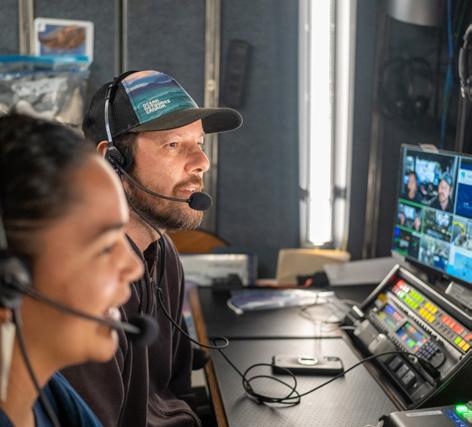
In FY22/23, ONC hosted five Ship2Shore events using video conferencing, satellite technology, and social media tools, engaging 669 youth and 33 educators within Canada.
The program offers a unique learning opportunity for students and lifelong learners alike, demonstrating the range of roles that can apply under broad labels, such as ‘scientist’ or ‘student’. Topics during the live Q&A sessions included the scientific motivations for the expedition and trouble-shooting at sea when the conditions or technology proved challenging.
Nick Hammar (ONC learning and engagement) and Campbell River (School District 72) student Gwenyth looking at chlorophyll under a black light and experimenting with liquid densities.
Monika Pelz (ONC learning and engagement) representing ONC at Ocean Week Victoria.
OCEAN
Page 18
Connecting with classrooms via the Ship2Shore program.
NETWORKS CANADA
Discover Pacific sea life in the Canadian Museum of Nature
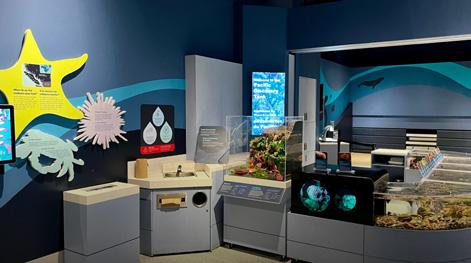
A new, permanent exhibition showcasing sea creatures that thrive in west coast tide-pool environments and their connection to coastal Indigenous Peoples launched at the Canadian Museum of Nature in Ottawa in FY22/23.
The Pacific Discovery Tank exhibit was the result of a partnership between ONC, the Canadian Museum of Nature, and the Nuu-chah-nulth Tribal Council. Visitors encountered live sea stars, sea cucumbers, tentacled anemones, and spiky urchins, and learned of these creatures’ importance to coastal Indigenous communities in British Columbia.
The exhibition incorporated another ONC-supported project, Nuu-chah-nulth Ocean Knowledge Cards, a cross-cultural learning tool that combines western ocean science and Indigenous Knowledge to better understand sea life along the Vancouver Island coast.

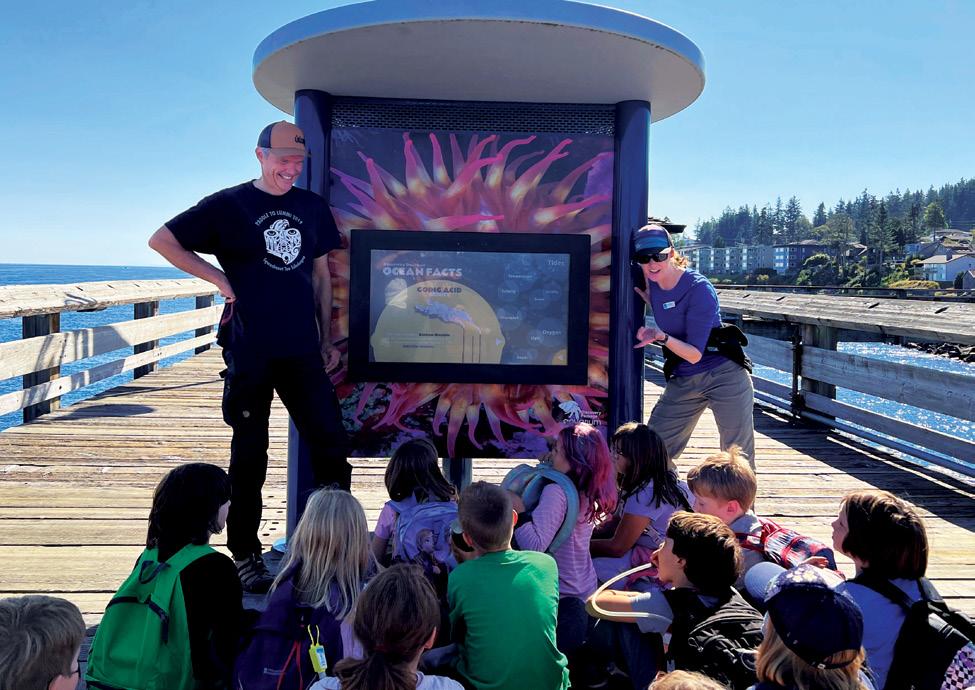
Exploring STEAM at Science Rendezvous
ONC partnered with UVic and Camosun College to bring Science Rendezvous to Victoria for the first time in person in May 2022. Science Rendezvous is a national outreach initiative and one of the largest one-day festivals to promote STEAM in Canada.
Over 1,000 people came to both campuses to learn from world-renowned scientists and K-12 educators. ONC hosted a variety of activities, from learning about creatures of the deep to the impact of ocean noise on marine life to piloting robots on the seafloor!
Lauren Hudson from ONC with Mark Wunsch of Greencoast
Media at Campbell River Pier.
Nuu-chah-nulth Ocean Knowledge Cards.
The new exhibit tells the story of the Nuu-chah-nulth First Nations’ relationship with West Coast sea creatures.
“By integrating Indigenous placebased knowledge within this live tank exhibit, visitors can learn about sustaining these species in their own local coastal environment as well as better understand Indigenous Peoples’ cultural connection to the ocean.”
Page 19 Annual Report FY22/23
Pieter Romer ONC Indigenous community liaison
UNITED NATIONS OCEAN DECADE
In response to the call from the United Nations Decade of Ocean Science for Sustainable Development (2021-2030) to develop “the science we need for the ocean we want,” ONC is spearheading and supporting a range of initiatives in collaboration with domestic and international partners.
ONC is co-leading and supporting Canada-led UN Decade of Ocean Science projects endorsed by the Intergovernmental Oceanographic Commission.
The science we need for the ocean we want
Supporting Indigenous-led solutions to ocean sustainability
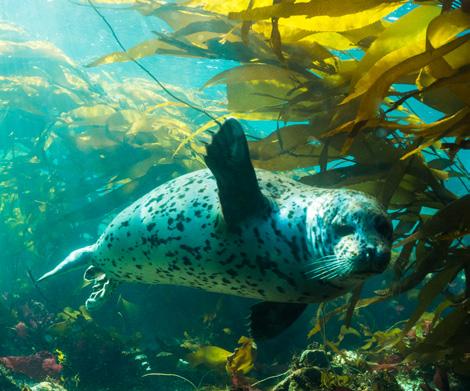
Advancing Indigenous Partnerships in Ocean Science for Sustainability (AIPOSS) aims to establish a path toward tangible Indigenous-led solutions to ocean sustainability, and to improve Indigenous capacity for ocean governance and ocean change resilience.

Ken Paul of the Wolastoqey Nation is leading this project in partnership with ONC and the Ocean Frontiers Institute at Dalhousie University. This project is supported partially by a financial contribution from Fisheries and Oceans Canada. Pisces Research Project Management Inc. is also a key partner.
In alignment with the UN Ocean Decade priorities, the project aims to achieve equitable, sustainable, and inclusive ocean economy sectors within Canada that better connect Indigenous communities with international networks. AIPOSS brings together Indigenous leaders and potential investment partners from industry, academia, foundations, and non-governmental organisations.
Online toolkits for students and educators
In collaboration with multiple partners, ONC co-created two online toolkits offered during Ocean Week Canada 2022. The Postsecondary & Early Career toolkit was curated by Early Career Ocean Professionals (ECOP) Canada and ONC. It is geared toward those who are exploring opportunities in the ocean sector or wanting to expand their knowledge on topics such as ocean health and Canada’s blue economy.
The Schools #1 toolkit, crafted by the Canadian Network for Ocean Education (CaNOE) and ONC, is designed for educators across Canada. It provides ocean education resources and curriculum connections for each province/territory for K–12. The assets include videos, lesson plans, and infographics that share multiple ways of knowing the ocean, such as place-based learning and hands-on activities.

The Ocean Week Canada partnership was led by the Canadian Ocean Literacy Coalition, which has its administrative home at ONC. These projects, and other UN Ocean Decade programs that ONC supports, enhance the societal impact of ONC research and infrastructure.

OCEAN NETWORKS CANADA Page 20
UN Decade of Ocean Science
ONC is co-leading or supporting three of the eight Canada-led United Nations (UN) Ocean Decade Projects, endorsed by the Intergovernmental Oceanographic Commission (IOC).
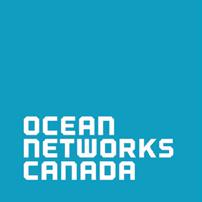
AIPOSS
(Advancing Indigenous Partnerships in Ocean Science for Sustainability)
An equitable, inclusive ocean economy with Indigenous-led solutions to ocean sustainability.
COLC
(Canadian Ocean Literacy Coalition)


ONC is a founding partner and administrative home for COLC.
OCEAN DECADE OUTCOMES
Ocean Decade Challenge

In partnership with Girl Guides of Canada and Fisheries and Oceans Canada. Engaging and fun ocean learning activities and opportunities for youth across Canada.
DOOS
(Deep Ocean Observing System)
Deep sea monitoring (ARGO floats, EBVs, bioluminescence)
OBON
(Ocean Biomolecular Observing Network)
eDNA observation
DITTO
(Digital Twins of the Ocean)
SeaTube & tsunami flood risk inundation modelling
Marine Life 2030 Community Fishers

Ocean Practices for the Decade

FAIR data practices, Indigenous data sovereignty
GEOS
(Global Ecosystems for Ocean Solutions)
CO2 removal research
One Deep (One Ocean Network for Deep Ocean Observing)

Deep ocean and hydrothermal vent observation
GO2NE & GOOD
(Global Ocean Oxygen Network & Global Ocean Oxygen Decade)



Dissolved oxygen monitoring
OARS & BC OAH plan
(Ocean Acidification Research for Sustainability and BC
Ocean Acidification and Hypoxia Plan)
pH, pCO2, O2 monitoring
BECI
(Basin Scale Events to Coastal Impacts)
Long-term oceanographic variable monitoring
COBRA
(Crustal Ocean Biosphere Research Accelerator)
Carbon sequestration in oceanic crust research
Ocean Community:
Engaging through Best Practices
Coastal observing, citizen science, community fishers
Arctic Action Plan
Arctic ocean monitoring
GO-BCG
(Global Ocean Biogeochemistry Array)
Deep BCG-Argo float deployment (2023)

CONTRIBUTIONS
TO THE
Safe Healthy and resilient Accessible Productive Predicted Inspiring and engaging Clean
ONC monitors the Pacific, Atlantic, and Arctic coasts of Canada, collecting real-time, open data that deliver solutions for science, society, and industry.
ONC partnering in existing major programs
Page 21 Annual Report FY22/23
ONC is contributing to
COLLABORATIONS
ONC works closely with valued partners in government, industry, science, and communities to support Canada’s marine conservation goals, blue economy strategy, and the goals of the High Level Panel for a Sustainable Ocean Economy and the United Nations Decade of Ocean Science for Sustainable Development.
Government Partners
ONC acknowledges with gratitude the tremendous support from major funders this fiscal year that maintains our world-leading ocean observatories. This commitment from our partners enables ONC to operate its physical and digital infrastructure and to continue delivering essential ocean data and data products to users across the globe.
Major Science Initiatives Fund
In August 2022, the Government of Canada announced funding of more than $628M through the Canada Foundation for Innovation’s Major Science Initiatives Fund to support ongoing operation and maintenance of research facilities of national importance. ONC was the largest recipient, with an award of nearly $115M over six years. This investment will be used to continue advancing ocean observing, to extend the reach and application of ONC data for the benefit of science, society, and industry.
Canada’s Ocean Protection Plan
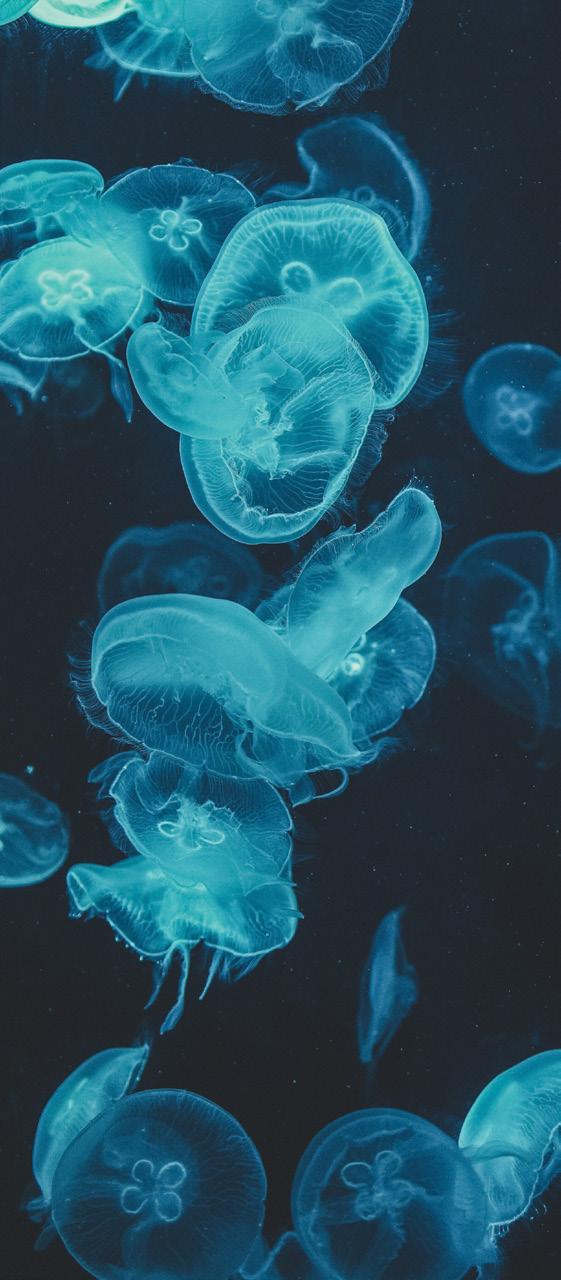
In February 2023, Fisheries and Oceans Canada announced $46.5M in funding over five years to ONC through Canada’s Oceans Protection Plan. This investment supports ONC’s network of cabled, mobile, and community-led observatories that collect data to monitor changes, including climate impacts and underwater noise. It also supports oceanographic radar and ocean buoy monitoring efforts that provide real-time information on wave and surface currents that help monitor ocean conditions and prepare for extreme events.
Together, these major awards support a large portion of ONC’s operating and maintenance costs.
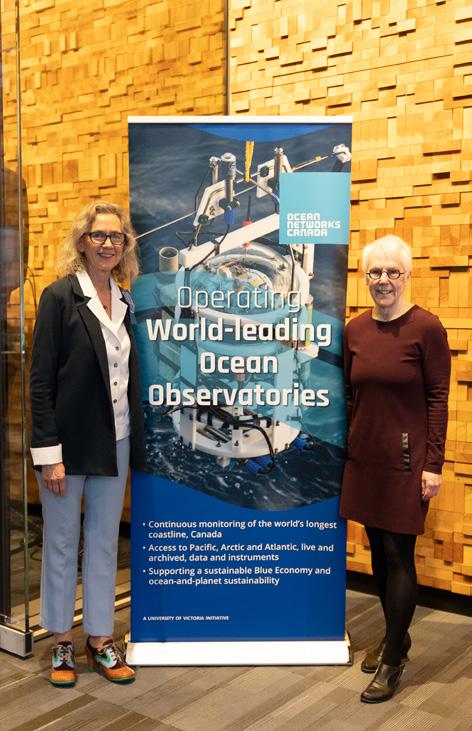
“Ocean science is essential to the protection and the sustainable use of oceans and waterways.”
OCEAN NETWORKS CANADA Page 22
The Honourable Joyce Murray Minister of Fisheries, Oceans and the Canadian Coast Guard
Earthquake early warning
Since 2016, the Province of British Columbia has invested close to $7M in ONC to install, operate, and test Canada’s first regional earthquake early warning system. FY22/23 marked the successful completion of this partnership, with ONC now operating 50+ land sensors and eight subsea sites at the Cascadia Subduction Zone using Canadian technology. A peerreview committee approved the system after several real-world tests that provided up to 71 seconds of warning to infrastructure operator partners, such as Protrans who operate the Canada Line SkyTrain. ONC is contributing its seismic data to Canada’s national alert system that will be operational in 2024.
ONC’s earthquake early warning system is a collaboration among government, academia, industry, and communities, and includes ONC, Natural Resources Canada, Emergency Management BC, the University of British Columbia, the United States Geological Survey, and the Pacific Northwest Seismic Network.

Digital Research Alliance of Canada
The Digital Research Alliance of Canada provided ONC with data storage and computing resources. The Alliance also supported some of ONC’s research data management projects, and provided funding for the World Data System – International Technology Office.
Industry Partners
In partnership with industry, ONC is developing and delivering world-leading ocean intelligence products and services.
Ocean Visions
Ocean Visions is a non-profit organisation at the centre of a multi-sector network that is catalysing innovation at the intersection of the ocean and climate crises. The network comprises universities, oceanographic institutions, and industry leaders focused on solutions that will stabilise the climate and restore ocean health.
As partners, ONC and Ocean Visions are committed to leading and enabling solutions for marine carbon dioxide removal (mCDR) by driving research and collaboration, and addressing gaps in key areas, such as conducting controlled field trials and establishing monitoring, reporting, and verification protocols.
COAST
ONC supports the Centre for Ocean Applied Sustainable Technologies (COAST), Pacific Canada’s hub for the sustainable blue economy. In this fast developing ecosystem, COAST and ONC are accelerating marine technology startups and helping them scale. COAST is a branch of the South Island Prosperity Partnership, an alliance of over 70 public and private-sector partners in Greater Victoria.
Running Tide
Running Tide is a global ocean health company seeking to rebalance the carbon cycle through nature-based innovations. Running Tide and ONC partnered on a deep sea experiment to study the possible impacts of sunken biomass within a benthic ecosystem. The research will inform Running Tide’s upcoming proposal to sequester atmospheric CO2 by sinking terrestrial and marine biomass to the deep seafloor.
Cascadia Seaweed
Cascadia Seaweed cultivates local species of kelp on low-impact ocean farms in partnership with coastal First Nations. The company uses that kelp to manufacture products for crop and cattle farmers to address two global challenges: food security and climate change. Cascadia Seaweed and partners are collaborating with ONC to coalesce traditional monitoring with cutting-edge ocean monitoring techniques, and researching how coastal kelp farms can provide habitat for migrating Pacific salmonids and their food sources.
“Through the Oceans Protection Plan, our Government continues to invest in scientific research and technology, and collaborates with and supports organizations such as Ocean Networks Canada, and Indigenous and coastal communities, to increase our understanding of how to protect coastal ecosystems.”

Page 23 Annual Report FY22/23
The Honourable Omar Alghabra Minister of Transport
ONC’S REACH

ONC amplifies the impact of its research and data through mainstream and social media. Visibility in the mass media matters—high-profile research can influence policy, strengthen connections with other leading scientific organisations, and support evidencebased decision-making. It can also inform the public about vital issues, such as climate change.
Mainstream media
ONC-generated stories received 959.2 million impressions—i.e., opportunities to read, watch, or listen— after being picked up by television, newspaper, radio, and online news outlets in Canada and around the world. The estimated value of this media coverage equated to paid advertising of $31M (CAD). Earned media gives audiences the benefit of independent analysis and outside endorsement of the value of ONC research and news.

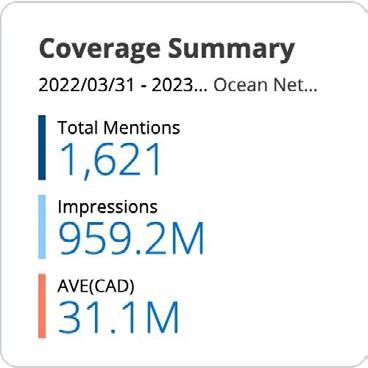
Highlights of ONC stories and news releases
Much of ONC’s media coverage was sparked by stories and announcements generated by the ONC communications team. ONC released 25 web stories and four news releases (listed below) in FY22/23.
From greenhouse gas to rock in 25 years (Solid Carbon)
• #1 UVic Top 10 Newsmakers of the Year 2022, in the category of Partnerships
• Impressions: 10.6M
• Covered by CTV television, CBC, Business in Vancouver, and more…

Estuaries’ vast potential for blue carbon sequestration
• #2 UVic Top 10 Newsmakers of the Year 2022 in the category of News Stories
• Impressions: 47.2M
• Covered by Global News, Globe & Mail, CTV Vancouver, National Post, and more…

Sea urchins on the move (ONC co-authored research)
• Promoted within the UVic climate action campaign
• Impressions: 51M
• Covered by Globe & Mail, CBC, The Canadian Press, National Observer, and more…
Canada’s national ocean observatory critical for ocean, planet
• Canada Foundation for Innovation Major Science Initiatives Fund announcement
• Impressions: 119.2M
• Covered by Globe & Mail, Financial Post, National Post, CTV, and more…
OCEAN NETWORKS CANADA Page 24

Social media: where engagement happens
Rich storytelling in social media engages ONC with industry leaders, government partners, and the wider community. In FY22/23, ONC received 110K views on content posted on Twitter, 89K on Facebook, 47K on LinkedIn, and 81K on Instagram.

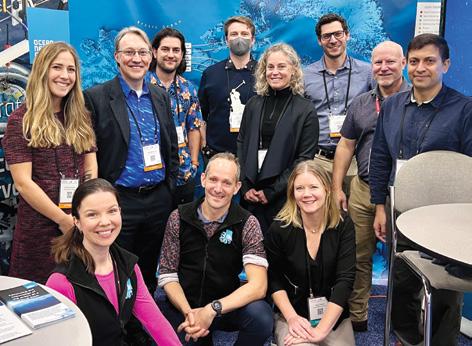
Earthquake early warning on LinkedIn
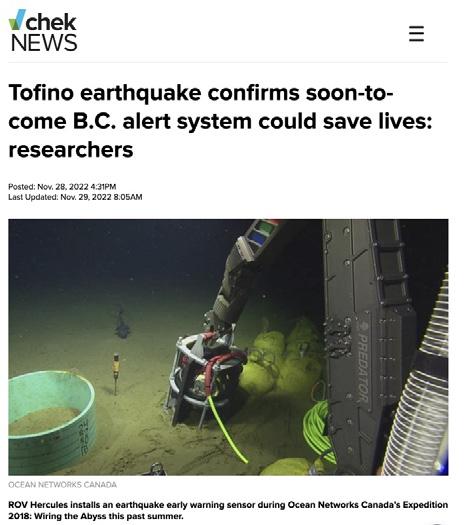
Stories sharing the success of ONC’s earthquake early warning system were popular across all platforms, particularly LinkedIn. With over 20K “unique impressions” (eyeballs), this story caught the attention of the emergency response community that is keen to benefit when the service launches. Mainstream media picked up the story on television, radio, and newspapers.
ONC’s top social stories included the announcement of Fisheries and Oceans Canada’s Ocean Protection Plan, which received thousands of views on Twitter and LinkedIn. ONC’s partnership with Fisheries and Oceans Canada and Girl Guides of Canada to launch the Ocean Decade Challenge program reached 2,444 users on Facebook.
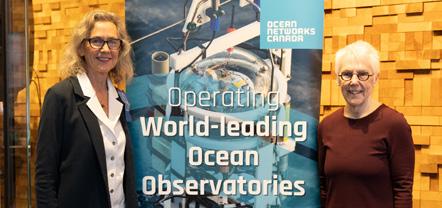

Videos are the biggest drawcard on social media. Seatube highlight reels performed very well on Instagram, with the top post reaching 4,032 users and 4,089 plays.
SeaTube on Instagram
ONC’s top Instagram reels reached over 1,000 accounts in less than a month. The high-resolution SeaTube video clips especially captured the attention of younger audiences.
Conferences
ONC participated in more than 15 conferences in FY22/23. With the welcome return to in-person events, ONC staff hosted booths at six events: Institute of Electrical and Electronics Engineers conference in Virginia Beach; Emergency Preparedness and Business Continuity Conference in Vancouver; American Geophysical Union Annual Meeting in Chicago; ArcticNet Conference in Toronto; Fifth International Marine Protected Areas Congress in Vancouver; and the American Association for the Advancement of Science Annual Meeting in Washington.
Page 26 OCEAN NETWORKS CANADA
I joined ONC’s Board in 2016, at its 10th anniversary, and have been proud to be a part of its mission to advance ocean intelligence for science and society. I’ve been especially happy to track ONC’s ever-greater focus on research and innovation to understand, mitigate, and respond to the impacts of climate change, the most pressing challenge we face.
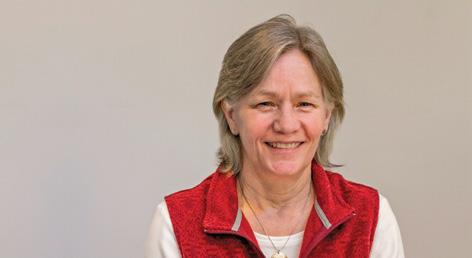
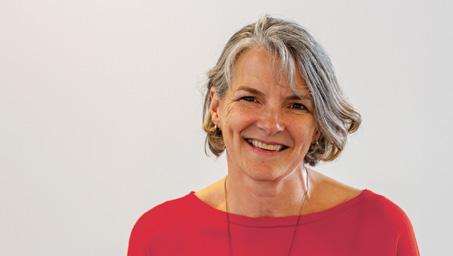
A highlight has been witnessing the evolution of ONC’s partnerships with Indigenous peoples across all of Canada’s coasts. These community-based observatories support Indigenous-led monitoring and stewardship, marine safety, and emergency response. ONC’s work exemplifies the deepening recognition of the value of meshing Indigenous knowledge with new technologies and cutting-edge academic sciences, as illustrated by the powerful Declaration of the Indigenous Delegation to OceanObs’19—sponsored and supported by the ONC team.
As outgoing chair of ONC’s Board of Directors, I want to express my appreciation for my colleagues (past and present) on the Board, who bring a broad range of expertise and a shared commitment to supporting this extraordinary organisation. I especially appreciate ONC president and CEO Kate Moran, who has been an inspiration to work with. Her vision and creative energy were a driving force that led to ONC’s current status as a world leader in ocean observation. As recipient of the largest CFI grant in Canada, ONC is certainly well positioned to achieve the notable objectives outlined in its 2030 Strategic Plan. I congratulate all those who have participated in making this possible.
Serving as the new Chair of ONC’s Board of Directors is both an honour and an opportunity to align my personal belief—that the ocean is the most important factor influencing life on earth as we know it—with my professional ambitions.

ONC’s infrastructure in Canada’s ocean, combined with its outstanding, high-calibre staff who transform the data into meaningful, relevant information, is key to unlocking our understanding of exactly how the ocean has, does, and can influence and enhance life for all species on this marvellous planet we call Earth.
ONC is uniquely positioned to explore and advance innovative approaches to gathering and sharing ocean data. This crucial endeavour helps science, industry, government, society—and indeed every human being—gain a better understanding of the solutions available to us to address the problems created by climate change.
I look forward to serving as a guide and helpmate as this essential organisation and its stellar and passionate staff work toward achieving the commendable goal of enhancing life on Earth.
A message from the chairs of the Board of Directors
Darcy Dobell outgoing chair
Page 27 Annual Report FY22/23
Rebecca Denlinger incoming chair
Financials FY22/23
The ONC Society audited financial statements for FY22/23, posted to the ONC website, reflect external contracts and services.
The revenues and expenditures are included in UVic’s audited financial statements. Scheduled activities for FY22/23 were carried out as planned, including FY21/22 maintenance postponed as a result of challenging weather conditions (funded through budget carryover of $1.8M). Totals are net of in-kind.
$12,111,944 Personnel
$9,601,182 Maintenance & Repairs
$1,435,012 Services
$834,066 General Administration & Other
$6,137,178 ONCS Operational Expense
$30,119,382 TOTAL
$11,703,503 Canada Foundation for Innovation
$8,900,000 Federal Government
$6,372,897 Ocean Networks Canada Society
$101,608 Corporation/Firms and Other
$1,456,000 University of Victoria
$28,534,008 TOTAL
Expenditures Revenue
40% 32% 5% 3% 20% 41% 31% 22% 6% 1% Page 28 OCEAN NETWORKS CANADA
# knowtheocean FY22/23
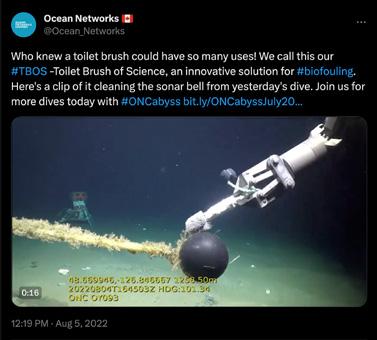

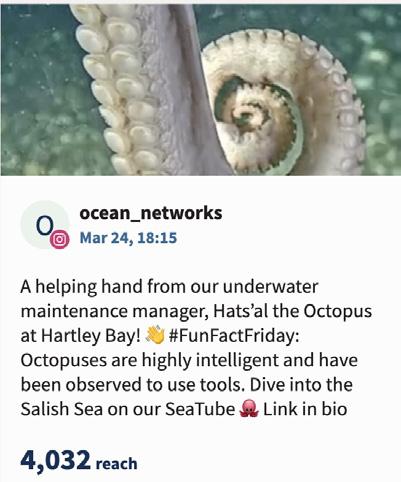
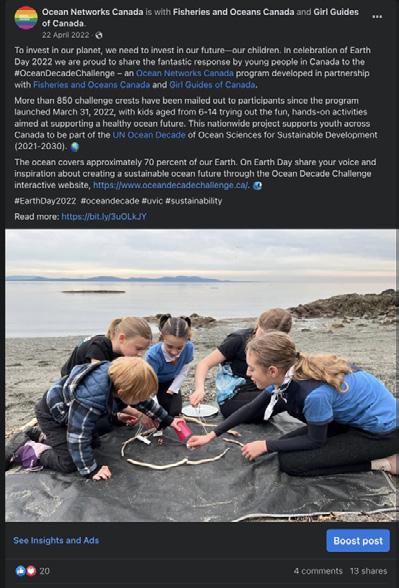
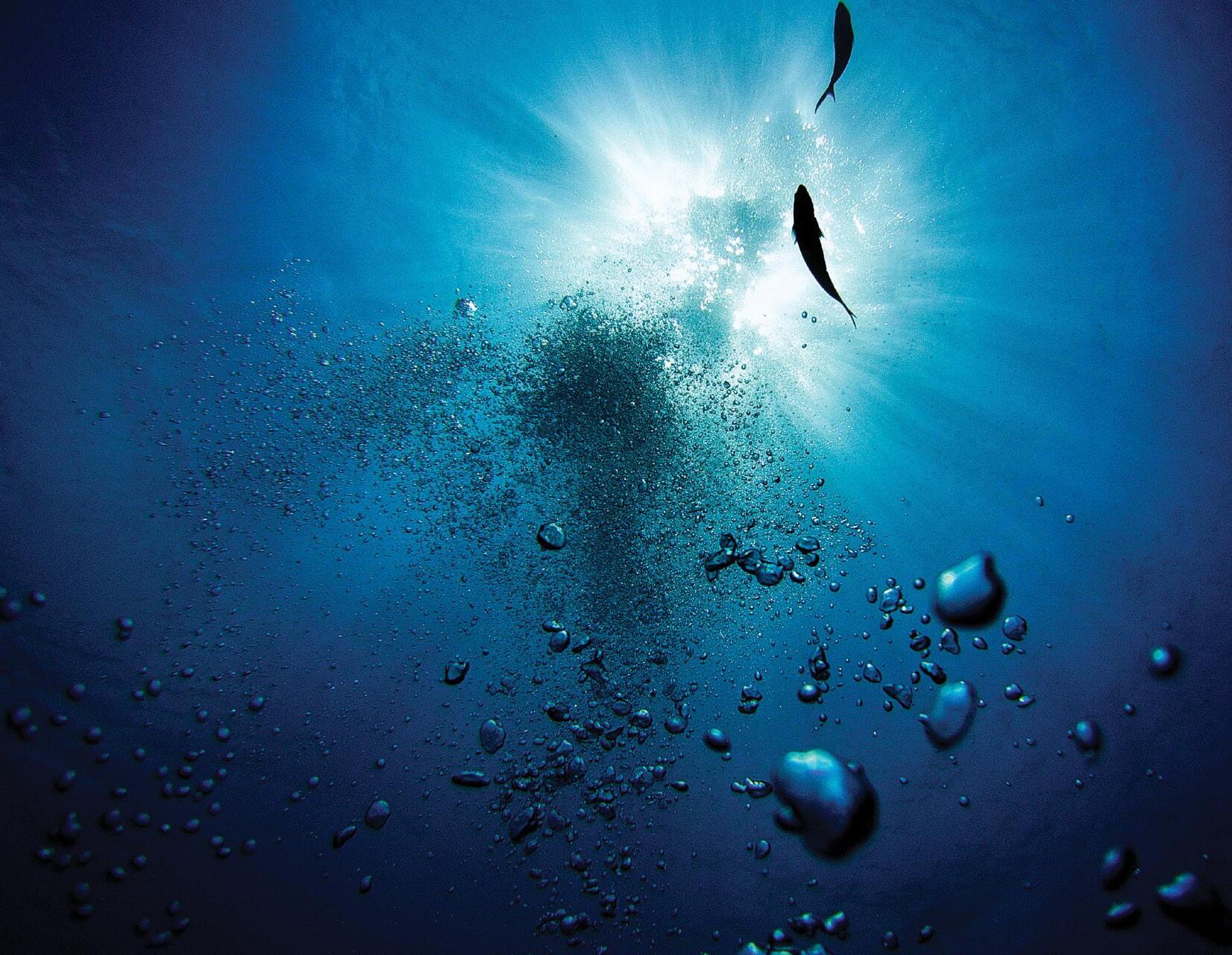
Social Media
Media Metrics
Social Media Highlights
5,110 Followers 5,196 Followers Followers 13,900 11,530 Followers 5,284 Subscribers K-12 Programs ONC develops educational ocean science resources and programs for communities, students, educators, and the public. 9,167 Youth (3,711 Indigenous) 119 Schools 768 Educators 34 Indigenous community partnerships
News articles & broadcast mentions 959.2. million Total audience reach
1,621 Annual Report FY22/23 Page 29
#knowtheocean
oceannetworks.ca

A UNIVERSITY OF VICTORIA INITIATIVE
ONC is primarily funded by: the Canada Foundation for Innovation, Government of Canada, University of Victoria, and Government of British Columbia.
Associate members: Fisheries and Marine Institute of Memorial University of Newfoundland, Dalhousie University, and EMSO-ERIC.
We are thankful for our many partners in industry, government, research, community, and higher education.






 Kate Moran President & CEO
Kate Moran President & CEO








 Seawater sampling, #ONCAbyss 2022.
The Delta Dynamics Laboratory.
Seawater sampling, #ONCAbyss 2022.
The Delta Dynamics Laboratory.

































































